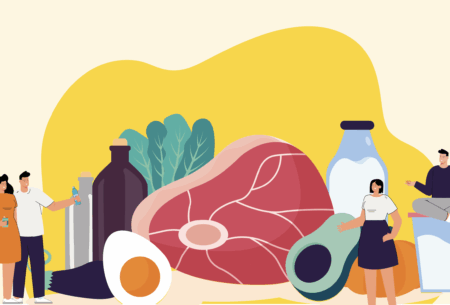January: the month where diet companies try to convince us to cut a bunch of foods from our diet to become the ‘New You’… Gluten, ‘starchy carbs’, dairy, chocolate, and even nightshade veggies (potatoes, peppers, tomatoes) and many putting wholegrains on the ‘naughty’ list.
Instead, we’re told we need to fill up on the detox drinks, bone broths, collagen shakes and colon cleanses to be our best self, especially if we’ve ‘over-indulged’…
But these are NOT based in real science! Here’s why cutting out foods could be bad for your health*…
Spoiler: you can still enjoy all your favourite foods AND be healthy!
- Restrictive diets can starve your body and in the case of very low carb diets can ultimately start to build up chemicals called ketones in your body. These ketones can make you feel nauseous, weak, dehydrated and irritable – and may even lead to more serious issues in the long term. That’s one reason why, outside of medical indications (e.g. epilepsy), I’d never recommend cutting carbs!
- Drastically reducing your food intake has been associated with weakening the immune system – for most people, that 1200 calorie diet just isn’t enough (fixating on calorie counting is not helpful, nor accurate, either).
- Detox supplements, cleanses and ‘teatoxes’ can often do more harm than good. That’s because those that contain laxatives (such as senna) can put you at risk of dehydration, nutritional deficiencies – and may even lead to pooping dependency in the future.
- Long periods of fasting can be actively harmful, as it can effectively starve our gut bacteria and reduce the diversity of our gut microbes. It’s this diversity that’s linked to better gut and overall health. For the low down on other types of fasting such as time-restricting eating, check out my book.
- It’s all about VARIETY! Sure, that green smoothie might be packed with nutritious goodness – but no one fruit or veg can provide nutritional nirvana. So if you’re downing nothing but celery juice, not only are you missing out on the all-important fibre from the whole plant food, you also won’t be getting all of the vitamins, minerals and other nutrients your body needs to function properly.
- Wholegrains and fermented dairy are a good source of important nutrients, including fibre, calcium, B vitamins, protein and many more. Wholegrains can also help to combat constipation as well as reducing your chances of developing several diseases, including type 2 diabetes, heart disease and several cancers.
My approach
Rather than thinking what you might need to cut out, think about what you can ADD IN! That way of thinking isn’t about a January diet you won’t be able to stick to, it’s about finding a balance that works for you and your lifestyle. And it’s about enjoyment too.
So enjoy more. More whole food, more diversity, more plant points. More fruits, veggies, wholegrains, beans and pulses, nuts and seeds, herbs and spices. More fibre. More flavour.
And if getting to a healthy weight for you (whatever that may be) is your driving force, just know that eating more fibre (a carb!) is linked to lower body weight, and those who include wholegrains and legumes in their diet are more likely to achieve not just a healthy body weight, but a healthy mind too.
*Unless you have a true food allergy and need to avoid! It’s best not to cut anything out. If you suspect an allergy, be sure to get it confirmed by a qualified medical practitioner and ideally managed with a registered dietitian, to ensure you’re not cutting things out unnecessarily.













